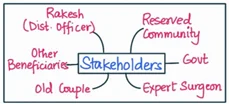Answer:
| Approach:
Introduction
Contextual Introduction.
Body
- Steps that Rakesh can take in response to the situation
Conclusion
|
Introduction:
In this case study, Rakesh, a district-level officer, is responsible for identifying beneficiaries under a health care scheme for senior citizens. The scheme has specific criteria that applicants must meet to be eligible for assistance. Rakesh should approach the situation with compassion and a focus on the well-being of the elderly couple. Although the couple does not meet criterion ‘b’ of belonging to a reserved community, their financial situation and the potential positive impact of the treatment on their quality of life should be considered.

Body:
Rakesh can take the following steps in response to the situation:
- Verify the authenticity of the couple’s application and medical condition: Rakesh should carefully examine the documents and medical reports to ensure the legitimacy of the couple’s claims and the severity of the medical condition.
- Seek guidance from higher officials or authorities: Rakesh can consult with higher officials or the governing body responsible for the healthcare scheme to seek guidance on how to proceed in such exceptional cases.
- Consider exceptions or special provisions: Rakesh can explore whether there are any provisions within the healthcare scheme that allow for exceptions or special consideration based on individual circumstances.
- Assess alternative sources of financial support: Rakesh can explore other potential sources of financial support, such as local NGOs, charitable organizations, or government schemes targeted at providing medical assistance to individuals in need.
- Advocate for the couple: If no immediate solution is available, Rakesh can advocate for the couple’s case within the appropriate channels, highlighting their unique circumstances and the potential positive impact of the treatment on their quality of life.
- Conduct a thorough assessment of the couple’s financial situation: Rakesh should carefully review the couple’s income and expenses to determine their actual financial need and whether they are genuinely unable to afford the incidental charges for the treatment.
- Consult with medical professionals: Rakesh can seek advice from medical professionals, including the expert surgeon who is willing to perform the surgery, to better understand the potential benefits of the treatment for the couple’s quality of life.
- Evaluate the availability of funds within the healthcare scheme: Rakesh should assess the availability of funds within the healthcare scheme to determine if there is any flexibility or provision to provide financial assistance to individuals who do not meet all the criteria but still require urgent medical treatment.
- Consider the long-term impact of the decision: Rakesh should consider the long-term implications of his decision, both in terms of setting a precedent for future cases and the potential impact on the overall effectiveness and fairness of the healthcare scheme.
- Seek legal advice, if necessary: In complex cases where there is uncertainty about the appropriate course of action, Rakesh may consult with legal experts to ensure compliance with relevant laws and regulations while balancing the ethical considerations involved.
Conclusion:
By approaching the situation with empathy, seeking guidance, and exploring all possible avenues of assistance, Rakesh can make an informed decision that prioritizes the well-being of the elderly couple while adhering to the established criteria as much as possible.
